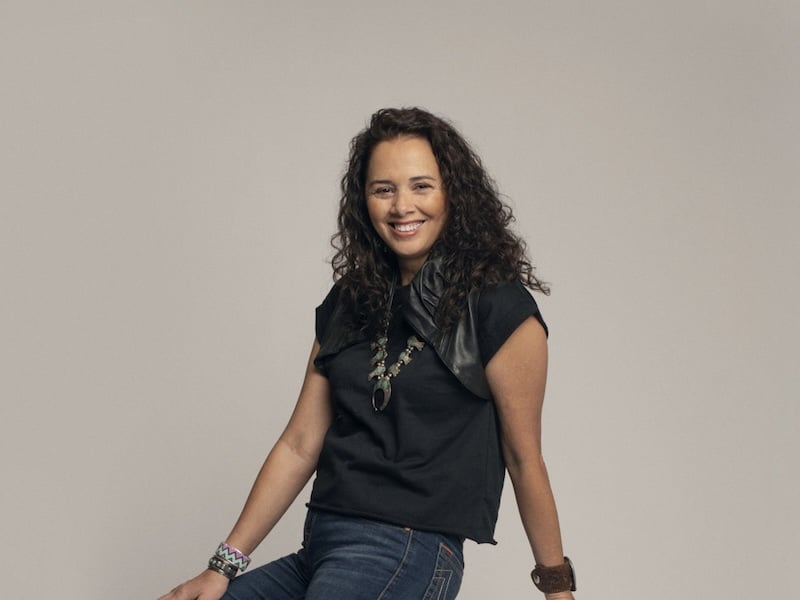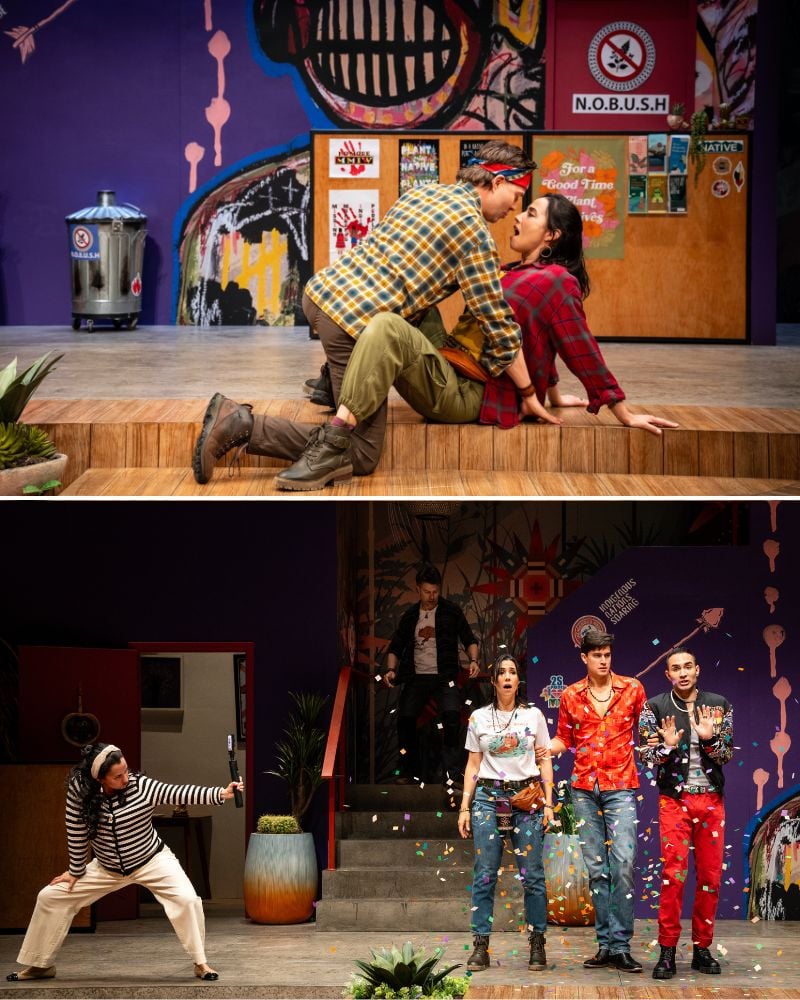Is it a satirical farce? Or a farcical satire?
“Either way, it’s a ridiculously funny, fast-moving play set in the nonprofit world, where I spend a lot of my time,” said Larissa FastHorse, the highly acclaimed Native American playwright whose latest opus, Fake It Until You Make It, is now enjoying its regional premiere at Arena Stage. (Click here for DCTA’s review of the play.)
FastHorse, whose “day job” is raising money for her own theater projects, is all too familiar with the nonprofit scene. In fact, as she pointed out during a lively interview at the Arena Café just before the opening, Fake It depicts a corner of that world, a small office building in which four organizations, similar to her own, serve Indigenous people. The clinker, in this case, is that two of the groups are competing for the same very large grant. And while both are being billed as “Indigenous-serving,” only one is actually Indigenous. The other is white.

According to FastHorse, the idea for Fake It came from Michael John Garcés, the director of Fake It and many of her other plays. The two have worked together for 13 years. “Michael suggested that I write a satirical farce. ‘Your work is so close to farce,’ he said, ‘because of its ridiculous action and the speed at which it’s performed. So why not just go ahead and do it?'”
“So I did,” she laughed.
“The finished play is a lot like French farce — Feydeau’s work, for example — in that there’s a combination of broadness and metaphor. It also allows for a kind of shorthand. For example, you know that if a door slams here, another door will open there. It’s a very free way to write. It’s a bit of a sex farce, too. It’s full of romping naughtiness. It was fun to write, fun to perform, and a lot of fun to watch!
“But beyond the comedy,” she mused, “it asks some serious questions, such as how do we define ourselves? And how do we categorize different groups?”
Like her previous plays, Fake It is about identity, but the emphasis, she averred, is greater than before. “I think I’ve gotten more specific in terms of the forms of identity that I’m exploring,” she told me. “ Right now, there’s a lot of ‘righteous confusion’ about why we identify in different ways. As an author, my job is not to say what I think, but to make you wonder what you think. I want to make you aware of the questions. I want you to go home wondering about the play, and then wake up the next morning looking for the answers! If we disagree, that’s fine. But I want you to know why you disagree.
“Bottom line,” she continued, “is that this is an idea play with a lot of jokes.” Put another way, it’s a silly play with a serious theme, which is a rare, but entertaining, combination, and one that is especially relevant today.
“This is going to sound Pollyanna-ish,” she said, “but we need comedy and laughter, and we need a space in which to come together to face difficult truths. Theater brings you face-to-face with people with whom you both agree and disagree. It forces you to hear people saying out loud the words and ideas that you don’t want to say or think. There is nothing like laughter to bring people together. Comedy forces us to engage, it forces us to see each other as human beings, because we laugh at the same things. And we have to go through this — the question of racial identity, or who we are — together.”

The play also deals with a Native American concept called two spirit identity, which is the idea that some people possess more than one gender. “It’s not a stigma,” she explained, “since people who have two genders are considered more sacred than others because they know more.” In the play, there are two characters — out of six in all — who have this kind of dual identity.
Four of the six actors in the cast are Native American, though from different tribal nations.
FastHorse herself is a member of the Sicangu Lakota Nation. Although she was born on the reservation, her family moved to Pierre, the capital city of South Dakota, when she was an infant. Her father was a leading educator who parlayed a degree in sociology into a role in the state corrections system. Later, he was one of the founders of two tribal colleges and created the sociology department at a community college in Pierre. “He was always interested in why people behave the way they do,” she said, adding that this play owes a lot to his work. “Fake It studies how people relate to each other.”
Although she began her career in classical ballet, she was forced to switch gears, after 10 years of dancing and choreographing her way across some of the top dance stages in America, due to an injury.
Now 53 — and looking twenty years younger (“the effect,” she laughed, “of doing ballet for so many years”) — FastHorse did not begin writing for the stage until she was 35.
At first, she tried writing for TV, but while she was good at it, she didn’t enjoy it. “Live theater is much more like ballet,” she said. “And farce, with its emphasis on movement, involves a lot of choreography.”
However, she did ultimately return to TV, beginning in 2019, with a series of projects for the Disney channel, NBC, and Apple TV. Along with Ty Defoe, she founded a new company, called Indigenous Direction, which boasts theaters, universities, and even the Macy’s Thanksgiving Day Parade among its consulting clients.
Though she is best-known for The Thanksgiving Play — a big hit in New York in 2023, when it became the first work by a female Native American playwright to make it to Broadway — that was by no means her first play. Nor was Fake It Until You Make It; both plays date back quite a few years.
Her first play, directed by Michael and mounted nine years ago in LA, was called Urban Rez. (That play is now part of a trilogy, scheduled for publication later this year.)
She and her husband, the sculptor Edd Hogan, live in Santa Monica, not far from the Mark Taper Forum, which celebrated its re-opening, after a long hiatus, with the world premiere of Fake It Until You Make It.
Asked why people should see it, she laughed out loud and pointed out the obvious. “Because everyone needs to laugh! Laughter is important for mental and physical health. Laughter adds years to life. It’s incredibly beneficial,” she said. “I love comedies. When I go to the theater, I want to be rewarded as well as challenged by new ideas.” She and Michael laugh all the time while developing new plays or concocting new ways to rectify old ones.
Why Arena? “I’ve known Artistic Director Hana Sharif for many years,” she said. “We worked together in Baltimore, back in 2015, and both served on the Theater Community Board. And we spent some really wonderful time together at a women’s retreat.”
Is there anything else that DCTA readers should know? I asked.
“Yes,” the playwright fairly shouted, her words echoing in the otherwise empty Arena café. “Everything, from the murals and music in the lobby to the art in the set and the actors’ costumes, has been created with the input of Native American artists and craftspeople.
“It costs more to commission everything, but Arena was committed to doing the right thing — and to making sure everything was paid for, rather than taken, as many theaters do, as ‘courtesy’ donations.
“The production,” she concluded, “is incredible.”
Fake It Until You Make It is a co-production with Centre Theatre Group, which unveiled it at the Mark Taper Forum last month. With just two more weeks to run, audiences will need to run to catch it before it leaves.
Fake It Until You Make It plays through May 4, 2025, in the Kreeger Theater at Arena Stage at the Mead Center for American Theater, 1101 6th St SW, Washington, DC. Tickets ($45–$149) are available online, by phone at 202-488-3300, or in person at the Sales Office (Tuesday-Sunday, 12-8 p.m.); tickets are also available at TodayTix. Arena Stage offers savings programs including “pay your age” tickets for those aged 35 and under; military, first responder, and educator discounts; student discounts; and “Southwest Nights” for those living and working in the District’s Southwest neighborhood. To learn more, visit arenastage.org/savings-programs.
Running Time: 90 minutes with no intermission.
The program for Fake It Until You Make It is downloadable here.
COVID Safety: Arena Stage recommends but does not require that patrons wear facial masks in theaters except in designated mask-required performance (Tuesday, April 29, at 7:30 p.m). For up-to-date information, visit arenastage.org/safety.
Fake It Until You Make It
By Larissa FastHorse
SEE ALSO:
Clever farce ‘Fake It Until You Make It’ at Arena sends up the absurdity of identity (review by Eileen Miller, April 12, 2025)
Arena Stage announces cast and creative team for ‘Fake It Until You Make It’ (news story, March 23, 2025)



